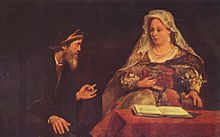以斯帖
波斯王后
(重定向自艾斯德爾)
以斯帖(希伯来语:אֶסְתֵּר,英语:Esther)天主教译为艾斯德尔,是希伯来圣经中《以斯帖记》所记载的波斯帝国王中之王亚哈随鲁的王后,名字来源于波斯词“星”(Ситора)。
| 以斯帖 | |
|---|---|
| 波斯王后 | |
| 配偶 | 亚哈随鲁 |
由于以斯帖的干预,此后2400年中一支犹太人一直住在波斯。


参见
编辑参考文献
编辑引用
编辑书目
编辑- Beal, Timothy K. The Book of Hiding: Gender, Ethnicity, Annihilation, and Esther. NY: Routledge, 1997. Postmodern theoretical apparatus, e.g. Derrida,Levinas
- Berlin, Adele。“Esther” in JSB, 1623-1625
- Jon Levenson Esther, an excellent commentary
- Michael Fox Character and Ideology in the Book of Esther, 2nd ed. Grand Rapids, MI: Eerdmanns, 2001. 333 pp., excellent literary analysis
- Sasson, Jack M. “Esther” in Alter and Kermode, pp. 335-341, literary
- Webberley, Helen The Book of Esther in C17th Dutch Art, AAANZ National Conference, Art Gallery NSW, 2002
- Webberley, Helen Rembrandt and The Purim Story, in The Jewish Magazine, Feb 2008, [1](页面存档备份,存于互联网档案馆)
- White, Sidnie Ann. “Esther: A Feminine Model for Jewish Diaspora” in Newsom
外部链接
编辑- stempublishing.com: Writings on the Old Testament
- The Book of Esther, Article by Ronald L. Ecker
- Additions to Esther(页面存档备份,存于互联网档案馆) Published in Eerdman's Dictionary of the Bible (2000)
- The Book of Esther(页面存档备份,存于互联网档案馆), online Bible
香港浸会大学图书馆 华人基督宗教文献保存计划
编辑- Chinese Christian Literature Council Collection 基督教文艺出版社藏书(页面存档备份,存于互联网档案馆) Expository Commentary on the Old and New Testament 旧约及新约释义丛书
- The Studium Biblicum OFM Collections 思高圣经学会藏书(页面存档备份,存于互联网档案馆)